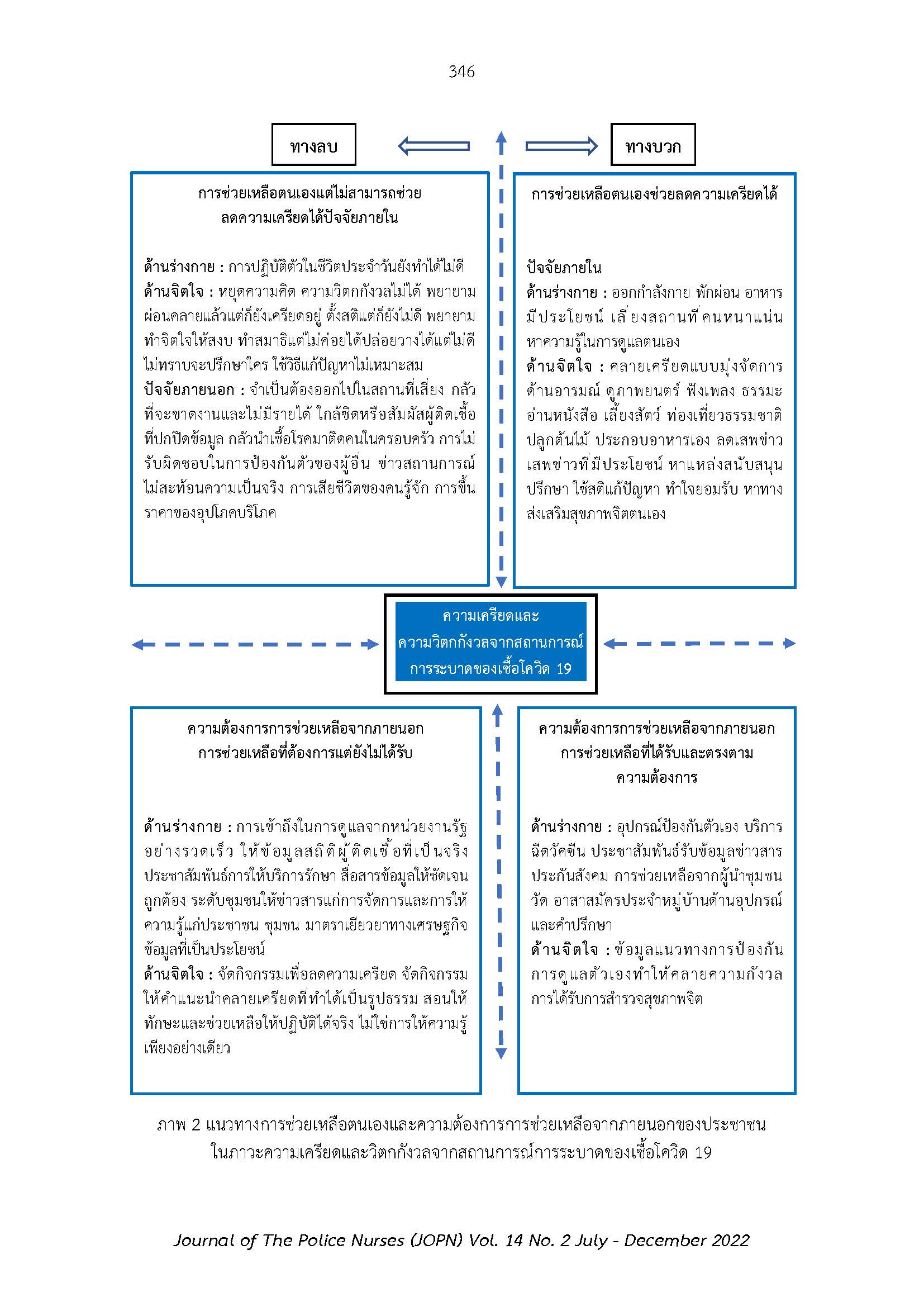SELF-HELP GUIDELINES AND EXTERNAL ASSISTANCE NEEDS OF PEOPLE WITH STRESS AND ANXIETY FROM THE COVID-19 PANDEMIC
Keywords:
self-help, support needs, stress, anxiety, COVID-19Abstract
This qualitative research aimed to study the self-help approach and external assistance needs of people with stress and anxiety caused by the COVID-19 pandemic. The informants were the people who came to be vaccinated against COVID-19 in a hospital in Pathum Thani province, a total of 30 people were selected by purposive sampling methods. The data collection was conducted using interviews on self-help approaches and external assistance needs of people with stress and anxiety due to the COVID-19 pandemic between February and March 2022. This interview was subjected to a content validity check from 3 qualified people. The index of item objective congruence (IOC) were .67 – 1.00. The data were content analyzed using Atlast.ti program.
The results showed that 1) people's approaches to self-help in a state of stress and anxiety caused by the COVID-19 pandemic were watching movies, listening to music, cooking, planting trees, staying with nature, and adjusting to positive thoughts. However, in some people, there were still stress and anxiety that could not be reduced because they cannot adjust their thoughts away from stress and anxiety. There are also external factors that cannot be controlled, including the need to go out to work and risky places, concealment of information from infected people, and news presenting that does not reflect reality, and 2) the needs for receiving external assistance that was consistent with the needs of the public were vaccinations, self-protective equipment, social security, and assistance from village health volunteers. Additional assistance that the public needed was to receive information that reflected reality, public relations of treatment facilities, community education management, and reduction of living costs.
The suggestion from this research, in addition to promoting the importance of self-protection, was that mental health should also be promoted to reduce stress and anxiety. Nevertheless, the promotion in this context is not just about providing information, but also guidance counseling and helping to gain practical skills in coping with stress in the right way.
Downloads
References
Bureau of Mental Health Strategy Department of Mental Health (2020). Statistical yearbook Thailand 2020. Retrieved from http://service.nso.go.th/nso/nsopublish/pubs/e-book/SYB-2020/2/index.html
de Pedraza, P., Guzi, M., & Tijdens, K. (2020). Life dissatisfaction and anxiety in COVID-19 pandemic (No. 2020-03). MUNI ECON Working Paper.
Hamza Shuja, K., Aqeel, M., Jaffar, A., & Ahmed, A. (2020). COVID-19 pandemic and impending global mental health implications. Psychiatria Danubina, 32(1), 32-35.
Junfeng, L., Zhiyun, Y., Hui, Q., Yu, W., Lingyu, J., & Junjun, J. (2020) Anxiety and depression among general population in China at the peak of the COVID 19 epidemic. World Psychiatry, 19, 2.
Kar, N., Kar, B., & Kar, S. (2021). Stress and coping during COVID-19 pandemic: Result of an online survey. Psychiatry research, 295, 113598.
Lazarus, R. S., & Folkman, S. (1984). Stress, appraisal, and coping. New York, NY: Springer.
Lima, C. K. T., de Medeiros Carvalho, P. M., Lima, I. D. A. A. S., de Oliveira Nunes, J. V. A., Saraiva, J. S., de Souza, R. I., . . . Neto, M. L. R. (2020). The emotional impact of Coronavirus 2019-nCoV (new Coronavirus disease). Psychiatry research, 287, 112915.
Salari, N., Mohammadi, M., Vaisi-Raygani, A., Abdi, A., Shohaimi, S., Khaledipaveh, B., . . . Jalali, R. (2020). The prevalence of severe depression in Iranian older adult: A meta-analysis and meta-regression. BMC geriatrics, 20(1), 1-8.
Torales, J., O’Higgins, M., Castaldelli-Maia, J. M., & Ventriglio, A. (2020). The outbreak of COVID-19 coronavirus and its impact on global mental health. International Journal of Social Psychiatry, 66(4), 317-320.
Wongpiromsarn, Y. (2020). Mental health and the COVID-19 crisis in Thailand. Journal of Mental Health of Thailand, 28(4), 280-291.
World Health Organization. (2020). Rolling updates on coronavirus disease (COVID-19). Retrieved from https://www.who.int/emergencies/diseases/novel-coronavirus-2019/events-as-they-happen

Downloads
Published
How to Cite
Issue
Section
License
Copyright (c) 2022 JOURNAL OF THE POLICE NURSES

This work is licensed under a Creative Commons Attribution-NonCommercial-NoDerivatives 4.0 International License.
ผลงานที่ได้ตีพิมพ์แล้วจะเป็นลิขสิทธิ์ของวารสารพยาบาลตำรวจ














